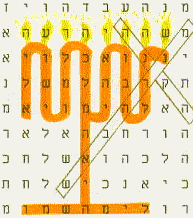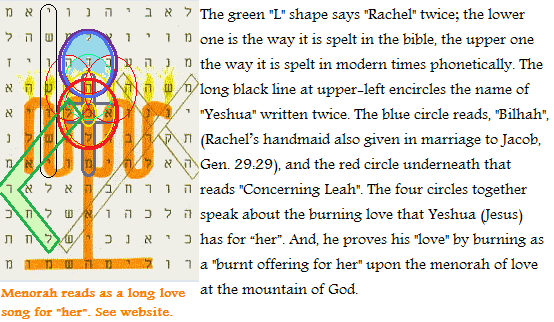Bible-Code Prophecy
The Burning Menorah
(as found at the Burning-Bush passage)Menorah at Mount
-1- -2- -3- -4- -5- -6-
Continued, Part 2
"The Lamp of His Flame"
(A "song of Moses?")
And they sing the song of Moses, the servant of God, and the song of the Lamb: "Great and amazing are your deeds, Lord God the Almighty! Just and true are your ways, King of the nations! Lord, who will not fear and glorify your name? For you alone are holy." (Revelation 15:3, 4a.)
The song of the Lamb is explained by the song of Moses: It is read in exactly opposite turns along the same branches of the menorah: (Click here for the significance of this.)
It seems the Holy Spirit speaks for Moses (and Elijah) ( a type of God's people):
"Jesus will be wearied on account of them (or "Him"),
The King of "I AM" is with Him--- a lamp of singing ---and (he is) with her!
The Lord will extinguish them, but they will circumcise the Gift (or "Lamb"?) of my God."
"Jesus will be wearied:" (See note below under heading "The small cross...")
"I AM" is the name revealed to Moses at the burning bush passage, and this is the same passage where this bible code is found! (Also, see notes below on the what the base of the menorah reads, i.e., "Moses, who is for me? What is His Name?")
"The Gift of my God" is Jesus, (2Cor.9:15). ' Circumcision' in this context points to Christ's death, as One that suffered the retribution of the law on the behalf of others. Moses is closely associated with circumcision in the scriptures, (Jn. 7:22-23.)
The small cross in the middle of the menorah:
"Jesus will be wearied because of them." This phrase answers to the later phrase, "The Lord will extinguish them." Wicked men tried to extinguish the lamp (life) of Jesus when they hung Him on the cross, but it is impossible to kill the Prince of Life, (Acts 3:15). Instead, in the end the risen Lord will put out the flame of all His enemies.
The above encoded word "extinguish" (consume) is the same word as used in the surface text where this picture bible code is found: "Moses saw that the bush burned, but it was not consumed," (Ex. 3:2). "Extinguish," therefore, is a play on words for an inextinguishable burning lamp. (The bible codes are also like the burning bush; they are an unquenching revelation of the Lamb of God, Revelation 1:1.) As a matter of fact, in forming this picture, the bible code uses two of the actual letters that spell this word "consume" in the surface text. Moreover, a small cross is formed at the center of the menorah using this very word from the surface Hebrew text. The word "He was consumed" forms the crossbeam, while the words, "Her King was put to shame," forms the horizontal pole---by reading down (ELS +120), and then back up (ELS -120). Jesus hung on the cross naked, an open "shame," (Heb.12:2). (Recall the sign placed above the cross: "The king of the Jews.")
The circle of letters formed in the middle of the small cross reads: (clockwise) "God is for her" (counterclockwise) for Leah." (I.e., The King is consumed on the cross for Leah.) He died for the sake of God and for the sake of redeeming a bride to Himself, (Revelation 21:9). Leah is a type of the bride of the Lamb here, and her name is a play on words for "to-weary." Recall the words that she sang in the menorah song, "Let Him weary for me."
'Bilhah' [and Rachel], (the other wives of Jacob), are also encoded here. As seen in the image at left, the five intersecting circles speak of the love of Jesus for Leah and Bilhah, (i.e., Israel and the Church?). The circles represent one great flame. (The middle of the five circles is also the middle of the seven flames of the menorah.) The four outer letters of the whole 'flame' twice read, "Concerning the sacrifice," and this expresses the overall theme of the whole flame.
The great flame reads, "O the ascending sacrifice! O the flame! O the love-- the love of God for her! The love for Leah, the love for Bilhah! Did He stutter for Leah? Did the Beloved (or 'love') of Bilhah wear out because of the path that He, the Ram of sufficiency, must walk? He will be a companion. The Lord will awaken her!" ("Stutter" and "wear out" are plays on sounds for the names Leah and Bilhah. The bible code is found near the text where Moses complains that he has a speech impediment. Moses is a type of Jesus. Reading around the entire perimeter of the flame, it reads, "Did a mighty One stutter, O Flame?")
Below, image facing in same direction as mountain image, which it overlaps.
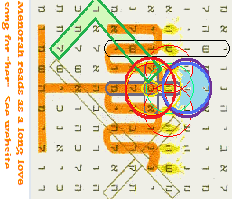
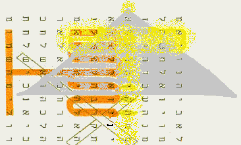
Next to "Part 3": The Rest of the Image of the Menorah.
It compliments the songs of Moses and the Lamb, and reads...
Menorah at Mount
-1- -2- -3- -4- -5- -6-
An aside discussion.
(See Dragon Bible Code for more information on the below image.)
The great flame in part reads:
"O' the ascending sacrifice! O' the flame! O' the love
-- the love of God for her!..."
Below is a sample of how the bible numbers cause various picture bible codes to overlap. Here they overlap by 1290 (i.e., burning-bush code overlap, not shown here; however, it has the same placement as the 1290 x 3), 1290 x 2, and 1290 x 3 letters. (The 1290 letter-years is further divided by 430 x 3.) Then the code has Christ ascending straight up and out from the flames little by little utilizing such numbers as 10 years (see Moth Bible Code) and 14 years (7 x 2). Christ becomes an offering that ascends to God. (Note that 1290 and 1290 x 2 are simply 3½ and 7-year periods with their leap months added. That is, 1290 [Daniel 12:11] is simply 1260 [Revelation 12:6] with the leap month added. The vertical length of Christ on the cross is itself 120 x 9 letters, which is 360 x 3, or 3 prophetic years. The menorah is 360 x 2.) (Also see, How Picture Bible Codes Overlap as one composite image! -1- -2- -3- -4-).
In the image below, every part of Christ is aflame except for His hands and feet, (symbolically speaking). Those things that bound Him to the cross were not burned even though all else burned. This is in contrast to the three Hebrew children in the fiery furnace. They were not burned at all except for the ropes that bound them! (Daniel 3). "He saved others, but Himself He cannot save!" Jesus appeared with them in the fiery furnace. He was the One "like the Son of Man/Adam".
In the code below, Christ ascends up to heaven from the flames similar to the story about the birth of Samson, (whose name means, 'sun-like'), (Judges 13). At the announcement about the birth of Samson, the Angel of the Lord ascended up to heaven in a flaming sacrifice ---the same Angel that appeared to Moses in the burning bush upon Mount Sinai! (Both the burning bush and burning mountain images [not shown here] also overlap this image! The symbolism of this code is similar to that in the moth code, and remarkably, these images also overlap!)
The menorah code is found in the book of Exodus while the image of Christ on the cross is found in Genesis. Remarkably, the two images stand side by side at only 19 letters apart if placed, as it were, in the same book. (See image below.) Christ on the cross is actually upside down allowing it to become upright in the BC/AD mirror, which is what this code does (at the said 1290 x 2 and 1290 x 3 letters, etc). Moreover, the symbolic dates that the position of the letters signify are of great biblical importance, such as 1446 BC of the exodus, as well as the births of Isaac and Jacob, and also Noah's flood. Thus 1290 (or 430 x 3 letters) allows the images to relocate and interact with other encoded images along a specific and well documented numeric grid. Therefore, not only is the bible code using biblical numbers that allow it to interact with the other images, but the picture codes are also moving along an established tract of epoch dates that are themselves in agreement with what the code is saying!!! In other words, the images are utilizing the very same numeric patterns (both dates and numbers) as discussed in the bible numbers website published before the codes were found!
Click to enlarge to show how
images are located close together!
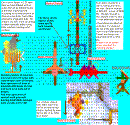
The great flame in part reads:
"O' the ascending sacrifice! O' the flame! O' the love
-- the love of God for her!..."
Also see, Mount Carmel Hanukah Forest Fire
